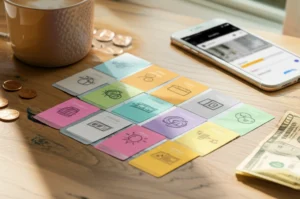Surprise Bills—Yikes!
Picture this: You’re cruising along. Everything’s kind of boringly normal. Then—bam. Your water heater does an epic impression of Old Faithful. Or your car starts making a strange noise and next thing you know, you’re stranded, calling for a tow truck. Sound familiar? Yeah, I’ve been there too (my water heater betrayed me last summer, thanks for asking!).
Here’s what nobody really says out loud about frugality, saving money, and building that magical emergency fund: emergencies rarely show up wearing name tags. So, how are you supposed to know what counts as a “real” emergency—that is, worth dipping into your precious savings for—and what’s just an annoyance? That’s the tough part, right?
Let’s walk through how the best money nerds (and, ahem, your new financially-savvy friend here) determine what actually qualifies as an emergency expense—and how you can save, budget, and stretch your dollars without feeling deprived.
Why Most People Miss This
Blink…And The Money’s Gone
Let’s be real. I used to think my budget was pretty tight. Then, one month, a speeding ticket and a dental bill showed up—neither planned, both totally annoying. Paid ’em out of my “emergency” stash. But was that smart? (Honestly, probably not. More on this in a sec.)
Here’s what happens: we hear “the three reasons to save money are for security, peace of mind, and freedom.” Of course—who doesn’t want that? So we squirrel away a few hundred bucks whenever life lets us…until temptation or confusion strikes.
Late Fees—The Silent Wallet Killer
Ever notice how if you make a late credit payment, you might see the lender add late fees and interest faster than you can say “whoops”? That’s one of those little-budget-busters nobody truly warns you about when you’re young. (I found out the hard way—$40 in random fees in one month. Ouch.)
| Scenario | Cost With Late Payment | Cost Without |
|---|---|---|
| Credit Card Payment | $30 late fee + interest hike | $0 (on time!) |
| Car Payment | $25 late fee | $0 (on time!) |
Story Time
Last year, my friend Jess missed her car loan payment by two days. She paid the principal, but the “surprise” fee hit her emergency stash. A non-emergency problem turned into an emergency-level cost—see how fast that happens?
How Much Is “Enough” Anyway?
Not All Budgets Are Created Equal
If you’ve ever googled “how much should I save for emergencies?” you’ll get an answer so broad it’ll make your head spin. Some say you need three months of expenses. Others swear by six months. And then I saw some research on spending habits saying even $2,500 can be a strong safety net for most folks living on average budgets.
I know what you’re thinking. “$2,500? I can’t even keep $250 in my account after rent.” Breathe…let’s break it down. Your fund doesn’t have to be built overnight. Small steps totally count.
Break It Down—Make It Real
Here’s the trick: figure out your essentials. Take one month. Write down (yes, old school!) every penny you spend. Separate “must pays” and “not-so-musts.” Essentials are rent, food, transit, minimum payments on loans—stuff you can’t skip.
Add them up. Multiply by three. That’s your starting goal. Example: Essentials are $1,200 x 3 = $3,600. Does that number stress you out? Remember—the why is it important to make an emergency fund your first financial priority? isn’t to make you feel bad, but to empower you. Everyone starts somewhere. Most people, including me at age 25, had less than $500 when I started.
Sneaky Ways To Save
- Set up an automatic transfer from checking to savings every payday (even $10!).
- Take your next pay raise—no matter how tiny—and save just half of it.
- When a subscription renews, pause and ask: do I actually use that gym app? Cancel, redirect those bucks.
Is This REALLY An Emergency?
Which Of The Following Questions Helps You Determine If Something Is Actually An Emergency Expense?
Here’s the part everyone always asks me—seriously, my group chat has a running tab of “is this an emergency, or nah?” Kind of like “should I text my ex?” but way more useful. So let’s get into it: which of the following questions helps you determine if something is actually an emergency expense?
- Does it threaten your health, safety, or shelter?—Think broken furnace in the middle of winter, not a surprise concert drop.
- Can waiting make it worse (and cost more)?—Medical bill after an injury? Yeah, don’t wait. Designer jacket on “one day only” sale? Not emergency.
- Is it an expense that could derail your basic budget for weeks or months if you didn’t cover it?—Total loss of work laptop when you’re a freelance designer? Emergency. Coffee maker broke? Well…maybe not.
- Was it impossible to predict, and no one’s fault?—You blew a tire on a pothole. Emergency. You forgot your best friend’s birthday dinner? Sorry, not emergency (guilty as charged).
- Is this covered by insurance or another fund?—Sometimes a “sinking fund” can step in, not your emergency stash. (Don’t worry, so many of us mix this up… more on that soon.)
Let’s Play: Expense Detective!
Ready? Imagine these scenarios—car breaks down, washing machine dies, you want to upgrade your phone, surprise dental work after biting into a popcorn kernel. Which of these are legit emergencies? Spoiler: Car repair after a crash? Yes. Concert tickets? Nope.
True-Life Oops
A quick story. My cousin bought front-row seats to her favorite band “because she’d been working hard and deserved it.” The next week, her brakes blew out. Guess where her emergency fund went? (Yup, memories…and then debt for the repair.) We’ve all been there. The trick is asking—for every weird bill—”which of the following questions helps you determine if something is actually an emergency expense?”
Emergency Funds Vs. “Sinking” Funds
Two Buckets, Two Purposes
This took me forever to learn, so let me save you some time. Not every big expense is a true emergency. Some happen regularly (like holidays, annual subscriptions, vet bills). These go in what’s called a “sinking fund”—a little pot you fill slowly so surprises aren’t so…surprising.
| Emergency Fund | Sinking Fund |
|---|---|
| Car dies unexpectedly | Car registration renewal |
| Sudden medical bill | Planned dentist visit |
| Furnace breaks in winter | Holiday gifts in December |
I wish someone had told me that planning ahead—even just a little—prevents those heart-thumping “How do I pay for this?” moments. Now, whenever I get the itch to splurge, I stop and think… “does this belong in my emergency fund, or should I start a sinking fund bucket on my app?”
Frugal Hacks That Work
Savings Without Misery
You don’t have to live on ramen to grow your emergency stash (unless you really want to—and hey, instant noodles aren’t the worst…). Small frugal tweaks really do stack up. Cancel one streaming service, and boom: that’s $15/month—$180/year—right there. Who knew?
Try doing a one-week “no spend” challenge. Treat it like a game: can you cook every meal from pantry stuff? Can you walk instead of Ubering? Share your wins on social (or just brag to your dog, like I do). It adds up, fast.
| Small Swap | Savings/Month |
|---|---|
| Pack lunch 3x/week | $40 |
| One less takeout coffee | $15 |
| Cancel unused app | $10 |
Why Make This Your First Move?
So, why is it important to make an emergency fund your first financial priority? Because stress goes down, confidence goes up, and you get to say “yes” to fun stuff without that guilt-fog rolling in. Don’t take it from me, take it from so much rate of return research—the money you stash here might not make you rich overnight, but it gives you freedom to invest and live without constant worry.
And… when life throws its inevitable curveballs, you’re ready. Seriously—peace of mind is priceless.
You Got This (& Next Steps)
Whew, we’ve covered a lot! Bottom line: emergencies are never fun, but they don’t have to be disasters, either. Ask yourself those key “which of the following questions helps you determine if something is actually an emergency expense?” every time a weird or scary bill shows up. Build your fund, little by little. Treat frugality like a puzzle—not a punishment.
Start by just tracking your spending this week (no shame—everyone’s got a few wild cards in their budget). Pause and ask, every time you’re about to dip into savings: Is this must-have or nice-to-have? Does it fit what we talked about above? Every step matters. The three reasons to save money are stability, flexibility, and, honestly, the freedom to say “yes” when the right things come along.
If you’re feeling overwhelmed, that’s normal. Just do one thing today: set up that $10 automatic transfer; write out your essentials list; ask yourself, “what’s my next true emergency likely to be?” Maybe today you dodge a late fee (and keep those late fees and interest where they belong—far from your life). Maybe tomorrow you feel even a little bit lighter.
I’d love to hear what your biggest “aha!” money moment is. Got a frugal tip I haven’t tried? Did you once mistake “emergency” for “concert tickets”? (Yeah, me too.) Let’s talk in the comments. Go be your own financial hero. You deserve it.













